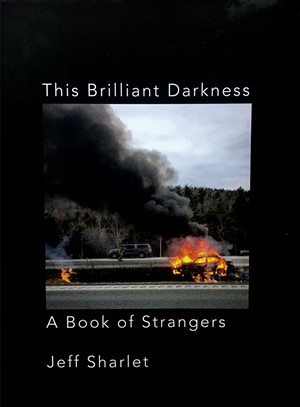
- Courtesy of Julia Rabig
- Jeff Sharlet
On March 1, 2015, an unarmed man named Charly "Africa" Keunang was shot dead by police officers on Los Angeles' Skid Row. Media reports described him as a homeless addict who had done time for bank robbery. Keunang was indeed those things, in journalist Jeff Sharlet's account. But he was not just those things.
Sharlet is a Dartmouth College associate professor of English and National Magazine Award winner. In a piece that first appeared in GQ and forms the centerpiece of his new book, he tells a much longer story about Keunang, an immigrant from Cameroon who read Shakespeare, posted philosophical tweets and dreamed of being in the movies. Sharlet talked to Keunang's sister, his friends, his partners in crime. He examined bodycam footage and interviewed police officers. He spent nights at Miss Mecca's store, a Skid Row gathering place.
What emerges is an irreducible portrait of "One black life that mattered, no more or less than any other," Sharlet writes. While the piece is rarely openly didactic, it's also a dark portrait of the authorities who killed Keunang, when they weren't doing things like attempting to restrict access to public bathrooms used by street denizens. Sharlet writes:
Such is the state of policing in America: funny because it's sad, sad because it's funny, unless you're black or poor or both, in which case it's as often as not simply an accusation. Of what does not really matter.
This Brilliant Darkness: A Book of Strangers isn't solely about police violence. It's a book about many things, chiefly photography, empathy and what it means to tell strangers' stories at all. But the story of Keunang exemplifies Sharlet's immersive, free-form mode of journalism. Illustrated liberally with photos, including the author's own, it alternates between traditional reporting and novelistic moments, such as an extended second-person account of the morning of Keunang's death from Keunang's point of view: "Darkness. Silence. Earplugs: You don't hear the street begin to breathe."

- This Brilliant Darkness: A Book of Strangers by Jeff Sharlet, W.W. Norton & Company, 336 pages. $25.
Is Sharlet, who is white, qualified to present that perspective? It's certainly a point worthy of debate. And This Brilliant Darkness doesn't gloss over questions about the role of the storyteller and the ethics of storytelling.
Many of the "strangers" in this book live on the margins: low-wage night-shift workers, addicts and dealers, a homeless woman eking out her food stamps, gay people in Russia under increasingly oppressive laws. As he tells these people's stories, Sharlet also tells the stories of how he came to tell them: a chance meeting on a night drive; a circuitous route to a hidden gay club; a conversation with a man who confronted Sharlet for snapping a photo of his home.
The book's organizing principle is the captioned Instagram post — or "fragment" or "snapshot," as Sharlet calls this format in the book's opening section. There the author describes how, driving from Vermont to Schenectady, N.Y., to visit his father after the latter's heart attack, he found himself "tired" of the weighty journalistic narratives he'd been writing. (Perhaps the best known of these is Sharlet's 2009 exposé The Family: The Secret Fundamentalism at the Heart of American Power, which became a 2019 Netflix docuseries.)
Instead of doing his assignments, Sharlet began snapping pictures of people he met on the road and sharing them on Instagram. The result was a creative rebirth: "As if I were only now, in the long night between my father's home and mine, becoming a writer," Sharlet writes. "My first words were pictures."
The story doesn't end on that triumphant note. As Sharlet finished a draft of This Brilliant Darkness, he suffered a heart attack, which then became part of the narrative.
Despite all these first-person revelations, the book never quite becomes a memoir. Nor is it one of those blustering narratives of the journalist-as-hero in which a writer evokes his personal struggles to make his achievements seem more impressive.
What we see here are relevant fragments of Sharlet's life — snapshots, nothing more. The phrase he uses repeatedly to shield the identities of his Russian subjects — "not his/her real name" — appears again when he quotes his own children, giving them a playful flurry of pseudonyms that calls attention to how little we really know about him.
If Sharlet and his reader remain strangers, so, in a sense, do he and his subjects. Where the author of an exposé purports to unearth a monolithic hidden truth, this book presents itself as a collection of provisional shards of truth, each tied to a particular place, time and witnessing.
For instance, the wrenching story of Mary Mazur, a mentally ill woman who lives in a Schenectady motel and loves horror movies and takes her plant everywhere she goes, is also the story of the journalist, who holds a door for her and drives her to Walmart and eventually leaves her there to shop all night, experiencing a freedom she feels nowhere else. "Bright lights, warm air, nobody making decisions for her." It's an unforgettable snapshot.
In his prologue, Sharlet asks us not to read the word "snapshot" as a minimization or "disclaimer ... to me it has come to represent something more ambitious, or maybe just more hopeful."
What is hopeful about a snapshot? It might be Sharlet's image of a Dunkin' Donuts night baker in a T-shirt adorned with an elaborate skull. It might be the shot of a poster of Keunang reading "REST IN POWER AFRICA!" that Sharlet reposted on Instagram in the wake of the killing of George Floyd. (Both of these images also appear in the book.) Or it might be the innumerable on-the-ground images from protests that we now see on social media, learning for ourselves how much power shared and annotated images can have.
This is a timely and riveting book about what it means to see, just for a moment, through someone else's eyes. In Sharlet's words, snapshots express "the deeply democratic, or even religious, notion that what I see — one person's vision — could matter to you so much that we could see together."










Comments
Comments are closed.
From 2014-2020, Seven Days allowed readers to comment on all stories posted on our website. While we've appreciated the suggestions and insights, right now Seven Days is prioritizing our core mission — producing high-quality, responsible local journalism — over moderating online debates between readers.
To criticize, correct or praise our reporting, please send us a letter to the editor or send us a tip. We’ll check it out and report the results.
Online comments may return when we have better tech tools for managing them. Thanks for reading.